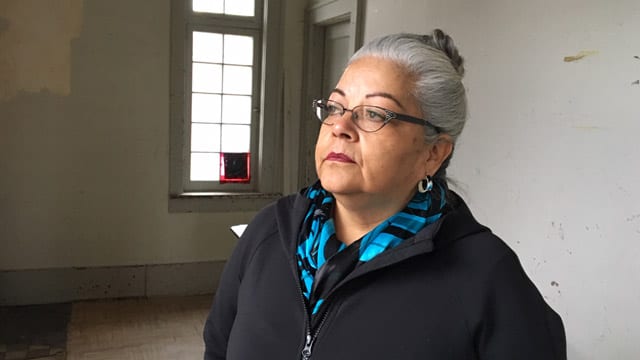
Day scholars like Jo-Anne Gottfriedson were left out of the Indian Residential Schools Settlement Agreement. Photo: APTN file
Residential school survivors in Kamloops can see the building where they went to school.
They can walk in the front doors and down the same halls as they did as children.
But they can’t get Ottawa to see them as residential school survivors.
And they certainly can’t get an apology.
Because for the Trudeau government to do that, it first needs to reach an “equitable” settlement for these day scholars who have been suing the federal government since 2012.
Day scholars attended residential schools during the day and went home at night because they lived close by, while other kids resided at the same schools.
The day scholars are now scheduled to take Ottawa back to court next month after years of mediation recently fell apart.
This was around the time Ottawa reached an agreement-in-principle with day school survivors last December. Those are students who attended residential schools that operated only during the day.
Both groups of survivors were left out of the 2006 Indian Residential Schools settlement agreement and have separate lawsuits against Canada.
All of it is pretty hard to accept for Jo-Anne Gottfriedson, a day scholar who was sexually abused by a priest at the Kamloops Indian Residential School.
Gottfriedson and other day scholars at Kamloops weren’t allowed to participate in the common experience payment process negotiated for other residential survivors of the Kamloops school, the ones who slept overnight, and all the others across Canada.
That also means that the 2008 apology from former prime minister Stephen Harper didn’t include them.
“It’s very disheartening and very frustrating to know our people’s lives aren’t honoured because Canada can’t decide what is a fair and just settlement for day scholars,” said Gottfriedson who attended the Kamloops school for several years as a child.
“To witness people passing away and were denied that opportunity for reconciliation is devastating.”
One of the survivors that passed away was her sister, Violet Gottfriedson, and there has been dozens more, including descendants, she said since the class-action was certified in 2015.
Violet passed away shortly afterwards.
“She left this world knowing Canada was responsible,” said Gottfriedson. “The day she died I was with her… she said ‘I want you to continue the work you are doing. Our people deserve justice. Don’t give up.”
Gottfriedson’s story was part of a special Nation to Nation episode in November where she entered the room where a priest abused her for the first time in years.
"At the 13th hour the Harper government said drop day scholars or we don’t have a settlement": see a special report on residential school survivors still fighting for justice.https://t.co/SYTLH3y8VO
Kamloops residential school below. pic.twitter.com/CTiRei6t0p
— APTN National News (@APTNNews) November 30, 2018
When the class-action was certified in 2015, it also included descendants of survivors as defendants and bands, the actual communities.
By leaving the day scholars out of the residential school settlement package, a judge agreed that bands could also sue the federal government for the loss of language and culture caused by the residential school policy.
It had never been done before. All previous settlements were only for survivors.
The two bands that first signed on were Tk’emlúps te Secwe̓pemc (Kamloops) and Sechelt First Nation in British Columbia. There are now over 100 bands signed on stretching across the country.
Garry Feschuk, the former chief of Sechelt, is a representative of the band portion of the class-action and has seen the impacts his community suffered because of the residential school policy.
“The day scholar stories are no different than the people who resided in the schools. They suffered the same pain, they same abuses and the genocide that everybody else went through,” said Feschuk. “How many more of our survivors are going to have to die before we actually seek redress for them?”
He said there was hope the action would get justice for the day scholars and reparations for the bands itself but that doesn’t seem to be the case any longer.
A “senior person” on the case previously appointed by the federal government was replaced in February 2018 by Department of Justice lawyers and they came in with a “minimal mandate” or a settlement offer well below than what day scholars are expecting.
The offer is confidential.
“What happened is we have gone full circle and we’re back on the steps of the court house again because Canada is minimizing the pain day scholars went through and I think it’s wrong,” said Feschuk.
They are willing to settle the survivor portion of the claim today if Ottawa can agree to the 10:3 formula, the same as the other residential school survivors received. That means $10,000 for the first year at a school and $3,000 for every other year.
The number of day scholars and descendants are estimated to between 14,000 to 18,000 survivors said Feschuk.
Matthew Coon Come is part of the action and said he is disgusted by the Trudeau government.
“Day Scholar survivors are literally dying, and yet the government is going to force us to litigate whether there was a residential school policy aimed at destroying our language and culture? That is the opposite of reconciliation,” said Coon Come, former national chief of the Assembly of First Nations, in a press release.
From Tk’emlúps te Secwe̓pemc, alone, 39 day scholars have passed since the court action began with 80 still alive, while 18 descendants have died, 187 remaining, during the same period.
The Trudeau government didn’t respond to questions from APTN by deadline.









